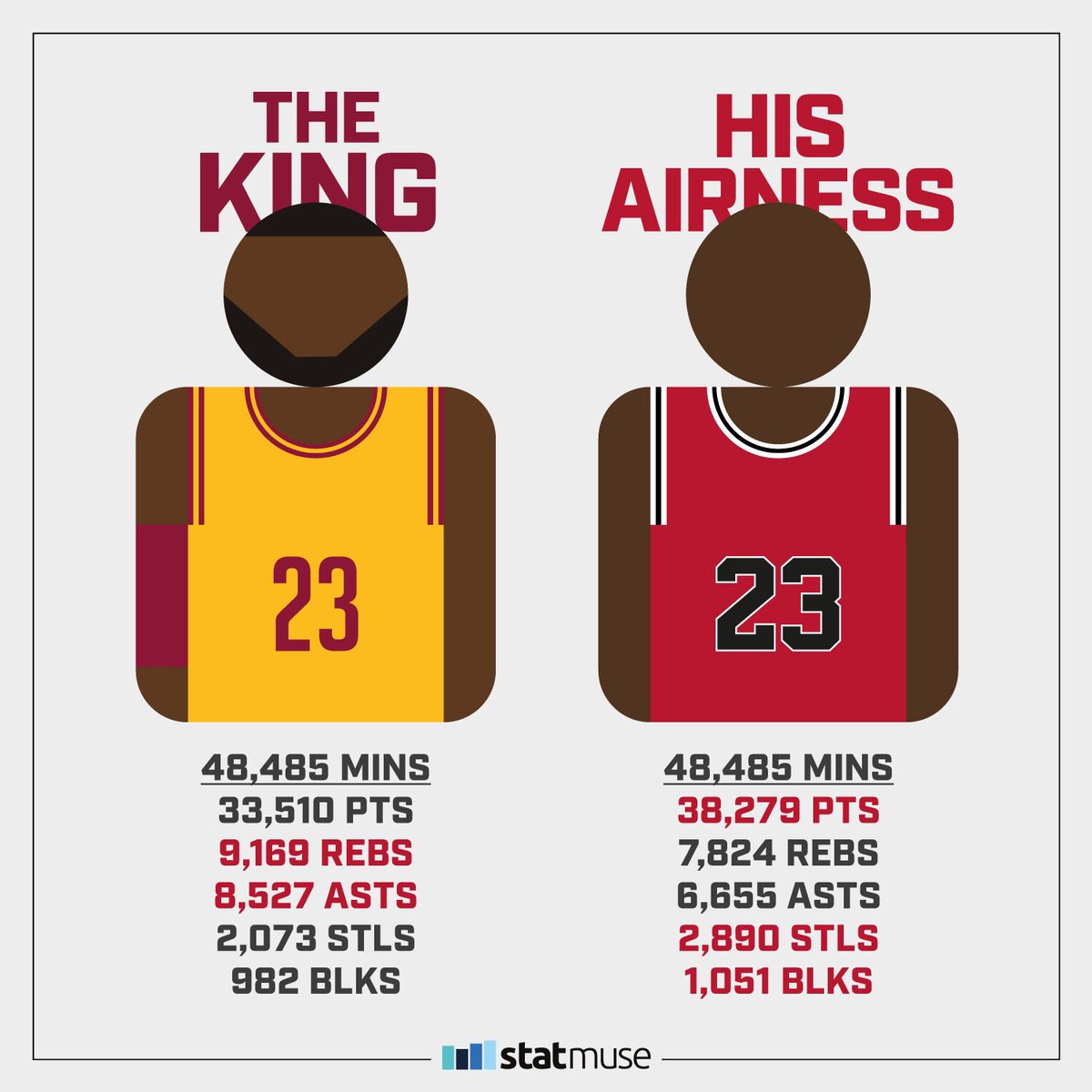

Nobody in the league’s modern era has shot so frequently and so well. He shot a lot, leading the NBA in usage rate eight times, but was remarkably efficient, finishing his career with a .497 field goal percentage.
#LEBRON JAMES VERSUS MICHAEL JORDAN STATS CRACKED#
Sometimes he did it by astronomical amounts - in 1986–87, he scored 37.1 points per game when nobody else in the NBA cracked 30. Basically, he led the NBA in scoring for the entirety of his prime, and it was a lengthy prime. The exceptions: his rookie year, the year he got injured, the year he came back from baseball, and his two years with the Wizards. He led the NBA in scoring 10 times, more than anybody, in 15 seasons. Jordan is almost certainly the greatest scorer ever to play the sport. For now, I think we have to agree: Both players are extremely good at basketball. But if he finishes his career with six rings and a bunch of Finals losses as well, we shouldn’t celebrate MJ for losing before the Finals so frequently. For now, James’s history of Finals losses make him look worse than Jordan. Jordan never lost in the Finals, but LeBron never lost in the first round. Jordan is the best at finishing first, but also had a real knack for finishing somewhere in between ninth and 16th. This graph compares both players’ finishes in the standings throughout their careers: But it also shows that LeBron has been better at getting to the Finals, whereas Jordan often failed to reach them. Some see this as an argument for Jordan’s postseason clutchness. It’s that he went 6–0 in the Finals, whereas LeBron is currently 3–4. MJ didn’t win his fourth ring until he was 33.īut it’s not just that MJ won six titles.

If the Cavs win this year, LeBron will have four rings at 32 years old. And he’s won three titles in the last five years. Three is not as many as six.īut of course, LeBron is still playing basketball, whereas MJ is retired. LeBron debate, so that we can carry on and enjoy the basketball currently being played. In this post, we will attempt to provide a comprehensive answer to the MJ vs. (It could be the greatest performance anybody has ever seen, and the next day your Twitter timeline would still be flooded with images of MJ smoking a cigar with his six rings on.) And with the endless wait between the conference finals and the Finals, we got plenty of arguments about this, distracting us from what we should be thinking about: how freakin’ great the basketball between the Warriors and Cavaliers should be. This was true when LeBron had 11 points it will be true if he has 111 points in Game 1 of the Finals. No single game in the middle of an incomplete playoff run could possibly turn the tide in either player’s favor. Turning each game of the postseason into an MJ vs. And wait, since when is Game 3 of the Eastern Conference finals the determining factor in the GOAT discussion? He’d scored 30 points in eight straight games, tying Jordan’s record, and though LeBron’s game may have been worse than Jordan’s worst, if he’d played well, it would have extended a streak that was as good as or better than Jordan’s best. LeBron’s Game 3 dud was a blip of inconsistency at the end of a run that rivaled or surpassed the most consistent stretches of Jordan’s career. But it’s also true that Jordan never won 13 consecutive playoff games he never even made it to 10. It’s true that Jordan had never performed so poorly. Jordan never scored fewer than 15 in a postseason game, never blew a 20-point postseason lead, and rarely lost playoff games after the player named "Isiah Thomas" stopped playing. It was embarrassing, especially against a Celtics team without Isaiah Thomas. He scored just 11 points, and none in the fourth quarter, as the Cavaliers let a 21-point lead evaporate. I was disappointed, but not surprised, to see the conversation after Game 3 of the Eastern Conference finals turn once again to the debate over whether LeBron James is as good as Michael Jordan was - or, more precisely, the loud insistence from a certain subset of NBA fans that LeBron certainly isn’t, and the persistent attempts of others to debunk their logic.


 0 kommentar(er)
0 kommentar(er)
